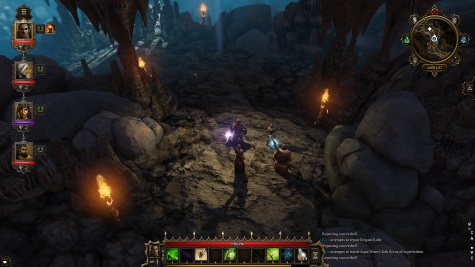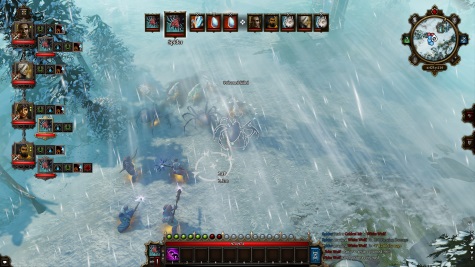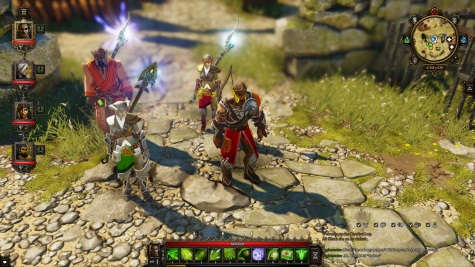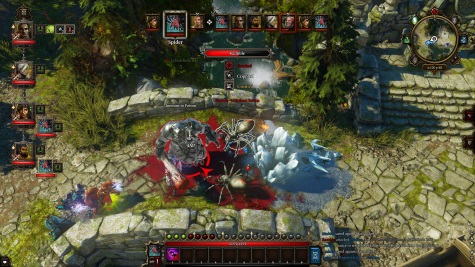I’ve had this game on my to play list for the longest time, having it recommended to me by multiple parties and having heard about it all the way back to its Kickstarter campaign. As usual partly due to being a bit tired of epic RPGs, I’ve kept putting it off until now. Even while playing, I’ve made liberal use of online guides because I couldn’t be too bothered about learning the whole system.
Thing is, I started this in Tactical Mode and my first impression was that the game is crazy hard because it took me like half a dozen reloads to beat the first introductory battle. Winning required precise positioning, liberal use of summons to tank hits and a fair measure of luck. Add to that the weirdly complex character progression system in which each level gives different benefits and I more or less gave up trying to figure the system out. As it turned out, later battles were far easier after you’ve picked up more companions and the extra skills to provide more tactical options, but that stupidly difficult first fight left a huge impression on me. Using the online guides did result in overpowered characters but it should be possible to win even in Tactical Mode using characters that aren’t perfectly optimized.
Still this is the game’s main draw: a tactical, turn-based combat system in which all kinds of effects interact with each other. This means that casting fire spells at an enemy has a chance of setting them on fire, causing damage over time. Normal enough you might say, but fire also reacts explosively with poison clouds. Casting a rain spell then puts out fires but water can transmit electric shocks from lightning spells and so on. Add to that is a frankly bewildering array of status effects some of which act like crowd control tools to temporarily take a combatant out of a fight and others which weaken them plus of course the various spells and skills to heal those status effects and you have a very rich combat system indeed. By the end of the game, you can expect to fill several toolbars worth of skills and spells and that’s not counting the extra abilities granted by equipment and consumables such as potions, grenades and special ammunition.
Once you get used to it, it is a very fun and highly satisfying combat system. I especially enjoyed how the designers decided to have fewer battles than one would expect in most RPGs but to make each one meaningful. Enemies never respawn in this game so once you beat an encounter you’re done with it for good. I found myself looking forward to each fight, making proper use of positioning and initiating the battles under favorable conditions to stack the odds and so on. That said, there are some annoyances such as battles in which almost none of your characters can take a meaningful action while enemies keep acting and enemies with very slow animation, but overall I will happily say that this is some of the best RPG combat I’ve ever played.
The story is competently written enough despite being the usual save-the-world prophecy stuff. The writing stands out for the omnipresent sense of humor which while not being fantastic is consistently amusing and worth a chuckle. What I dislike most of all is that the world is actually very small but made to seem bigger by stuffing the map full of content and winding paths through the available area in a very tortuous fashion. The scale of the plot is epic but that is poorly represented by the size and number of the maps in-game. There is little sense of exploration and it’s really weird that all these hugely important events seem to take place in the backyard of a single medium-sized city. I think the designers also made a mistake by starting the game at Cyseal which is too overwhelming with all of the people to talk to and all the vendors and the usual syndrome of a city filled with side quests. It just kills the pacing early on. I think it would make more sense to start out in the wilderness and work up to a trip to the city.
In fact, if you asked me I would greatly prefer a shorter, more streamlined game that focused on the excellent combat. I could have done without the complicated crafting system and the confusing variety of items that you pick up on your adventures. I mean, really, why would you pick up individual keys without an automatic keyring system? I also dislike how hunting down vendors of skill books is a pain and how you have to run between so many different vendors to check to see if they’re stocking something interesting and so on. Making a run back to town to offload unwanted items, checking to see which items are worth keeping and seeing if vendors have anything new that is better is a very time consuming task. In addition there are all kinds of little quirks to deal with such as how vendors always keep whatever you sell to them which clogs up their inventory. This means that you probably don’t want to sell trash to those vendors who you intend to buy from later as you will then have to scroll through too many items to work out which is new stock. This game would have been so much better if all this could be simplified.
The combat system isn’t perfect either. The man-at-arms tree seems weak in comparison to the marksman tree, especially as some of the skills aren’t auto-hit. Tanking attacks seems hard as well and you’d always to use summons to tank for you anyway. Those are uncommonly useful seeing as they scale to your level. But on the whole it’s so good that it holds up the rest of the game. There are plenty of times when I just want to get to the next battle but I’m afraid of ending up being too weak if I skip out on side quests, hunting secrets and shopping for the best items. Reading users reviews of the sequel, I see many complaints on that front as well, that the combat is excellent but the game tries to do too many other things. I suppose I will eventually get around to playing that but it will likely take a while.




One thought on “Divinity: Original Sin (Enhanced Edition)”